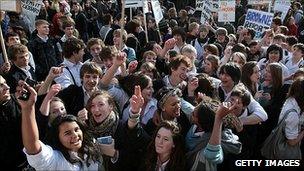Nick Clegg urges students to see 'true picture' on fees
- Published

The National Union of Students has backed a further day of protests on Tuesday across the country
Nick Clegg has urged students to reflect on the "true picture" about government plans to raise tuition fees.
Ahead of expected protests, the deputy PM said graduates in England on lower incomes would be better off than now.
It was "crucial" people realised there would be no up front fees and repayments would begin at £21,000.
NUS President Aaron Porter said it was "legitimate" to highlight "failings" of the proposals, which he said were "problematic, misleading or damaging."
A vote is due next month on plans to allow English universities to charge £6,000, almost double the current £3,290 cap, and up to £9,000 under certain conditions.
MPs will debate plans to allow student finance proposals and government plans to cut university teaching budgets and support allowances for low-income further education students on Tuesday.
It comes as further demonstrations, with a march organised by the National Campaign Against Fees and Cuts - and backed by the NUS - take place in central London.
Ahead of the event, Mr Clegg has written to NUS President Aaron Porter to urge people to consider the impact the proposed changes will have on people from poorer families wanting to go to university.
Under plans to raise the threshold at which people start paying contributions from £15,000 to £21,000 and to lower interest rates for low earners, Mr Clegg said someone whose salary started at £21,000 and rose to £27,000 after 20 years would find themselves having to pay an average of £7 a month.
Under the current system, he said they would be paying £45 a month.
"If we are agreed that people should only start to repay after they graduate and that those repayments should be linked to the ability to pay, then the important question is which system offers fairest method of payment," he wrote.
"While the Liberal Democrats have not been able to keep their pledge on tuition fees, I believe we have played an important role in proposing a new system in line with our fair, progressive values."
Student groups have said the fear of higher debts will put many people off from applying to university while research by the million+ and London Economics think tanks, published on Tuesday, suggests 60% of students will be worse off under the plans by an average of £5,000.
Mr Clegg said he was not seeking to stop people from campaigning or continuing protests which have seen thousands of students, lecturers and school children take to streets in cities across England and which led to violent clashes with police in London.
"If the proposals are passed by Parliament, I believe it is crucial that all of us are able to ensure that people know the true picture," he added.
"I do not expect to change your position... But I do believe the nature of that debate and the language we use, is important if it is not to have consequences that none of us want."
However NUS President Aaron Porter told him: "The anger felt at this betrayal is real, justified and desperately disappointing to those who placed in you their hope for a different politics."
He said the argument that the proposals were fair and progressive was "shaky", that the plan "introduces price as a factor in student choice", questioned how many part-time students would benefit and how the repayment salary threshold, of £21,000, would be affected by inflation.
It was "astonishing" to suggest that the National Union of Students was contributing to "misinformation": "It is entirely legitimate for us to highlight the numerous failings that surround the government's proposals."
Tax alternative
MPs are set to debate the proposals over the next couple of weeks, starting with an opposition-led debate on Tuesday in which Labour will seek to expose divisions within the coalition and increase pressure on Lib Dems under fire for abandoning a pre-election pledge not to raise fees.
Jenny Willott, the Lib Dem MP for Cardiff Central, was quoted as saying in the South Wales Echo that she would vote against any rises in tuition fees. The Guardian also said she had said she would vote against a rise.
Miss Willott told the BBC she had been misquoted and had not said she would definitely vote against the plans. She said her position was that she would "not support a rise in tuition fees. I'm waiting to see what is in the motion before deciding whether to abstain or vote against".
Lib Dem MPs are able to abstain on votes over tuition fees under the coalition agreement - Business Secretary Vince Cable, the minister responsible for universities, said on Tuesday he may abstain, even though his instinct was to vote for the proposals, if the party as a whole decided to abstain.
The government has insisted its "graduate contribution scheme" is fairer than an alternative graduate tax plan favoured by Labour leader Ed Miliband.
Mr Miliband says such a tax - details of which are yet to be finalised - would be more closely linked to an individual's ability to pay, but shadow chancellor Alan Johnson is among Labour figures who are sceptical.
The Conservatives say their own research indicates part-time workers and graduates earning up to £25,150 would be worse off under a graduate tax levied at 2% of income.